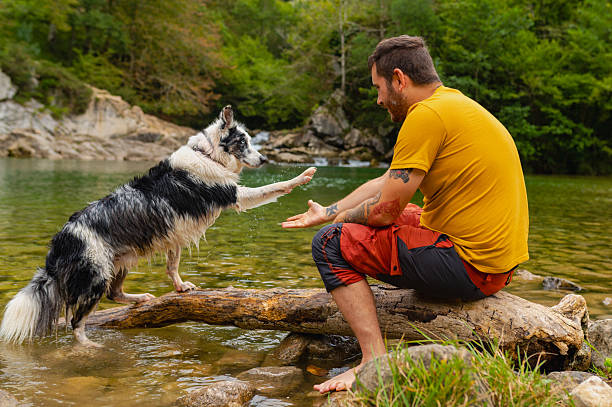
Unwavering Bonds: Exploring Why Pets Are More Loyal Than People
Dive into the science and stories behind pet loyalty, revealing how animals’ unwavering devotion often surpasses human bonds—shaping lives, healing hearts, and redefining what true loyalty means.
🐶 Pet Star
27 min read · 18, Jun 2025

Introduction: Defining Loyalty in the Context of Pets and People
Loyalty is a complex human value, often associated with trust, commitment, and steadfast support. When we think of loyalty, we tend to look towards our relationships with friends, family, and colleagues. However, many pet owners will attest that the loyalty of their pets—dogs, cats, horses, and beyond—often feels deeper, more unconditional, and more enduring than many human connections. But why is this the case? Is pet loyalty merely a product of domestication, or is there a deeper psychological, biological, and emotional foundation that makes pets more loyal than people?
This article explores the multifaceted concept of loyalty by analyzing how pets demonstrate unwavering devotion, supported by scientific research, expert insights, and compelling anecdotes. We will also examine how pets’ social and cognitive traits foster loyalty, how human relationships contrast with animal bonds, and what this teaches us about the nature of loyalty itself.
What is Loyalty? A Psychological and Sociological Overview
Loyalty: More Than Just Faithfulness
Loyalty can be defined as a strong feeling of support or allegiance. In humans, it is often conditional—shaped by shared experiences, reciprocity, and social norms. Loyalty requires cognitive evaluation, trust-building, and sometimes involves complex emotions like forgiveness and sacrifice.
How Pets’ Loyalty Differs From Human Loyalty
Unlike human loyalty, which can be influenced by societal pressures, biases, and changing circumstances, pets often show loyalty driven by instinct, emotional bonding, and survival needs. Their loyalty is less conditional and more rooted in the immediate bond they form with their caregivers.
The Science Behind Pet Loyalty: Biological and Evolutionary Insights
Oxytocin: The ‘Love Hormone’ in Humans and Pets
Research shows that interaction between pets and owners releases oxytocin in both parties. This hormone promotes bonding, trust, and social connection. Studies indicate that dogs, in particular, have evolved to trigger oxytocin release in humans, deepening the emotional bond.
Evolutionary Roots of Pet Loyalty
Dogs descended from wolves that lived in tightly knit packs, relying heavily on cooperation and loyalty for survival. This evolutionary history underpins dogs’ social behaviors and loyalty toward their human ‘pack.’ Cats, although more independent, form strong bonds based on mutual trust and companionship.
Contrasting Human Loyalty: Why People Sometimes Fall Short
Complexity of Human Relationships
Humans juggle numerous social roles and influences. Loyalty can be fractured by misunderstandings, betrayals, or shifting priorities. Unlike pets, people’s loyalty is frequently tested and sometimes conditional.
Modern Society’s Impact on Loyalty
Social media, transient lifestyles, and individualism can erode traditional loyalty in human relationships. In contrast, pets remain constant, offering unwavering companionship regardless of circumstances.
Psychological Benefits of Pet Loyalty for Humans
Emotional Support and Mental Health
The unconditional loyalty of pets provides a unique source of emotional stability. Pets help reduce loneliness, anxiety, and depression through their constant presence and affection.
Building Trust and Security
Pets foster a safe emotional environment where owners feel accepted without judgment, strengthening self-esteem and resilience.
Can Pet Loyalty Teach Us About Human Relationships?
Lessons in Unconditional Acceptance
Pets exemplify acceptance without prejudice, which challenges humans to cultivate similar qualities in their relationships.
The Role of Reciprocity
While pet loyalty often appears unconditional, it thrives on consistent care and affection. This balance offers a model for healthy human relationships.
Expert Opinions: What Behavioral Scientists Say About Loyalty in Pets
Insights From Animal Behaviorists
Experts highlight how pets’ social structures and cognitive abilities underpin loyalty behaviors. Dogs’ sensitivity to human emotions enhances loyalty, while cats’ selective bonding shows a different but equally strong form of devotion.
Veterinarians’ Perspective on the Human-Pet Bond
Veterinarians observe that pets thrive on routines and emotional consistency, reflecting loyalty as a vital component of their wellbeing.
How to Foster and Appreciate Your Pet’s Loyalty
Creating a Nurturing Environment
Providing stability, affection, and clear communication encourages deeper bonds and loyalty.
Understanding Pet Communication
Recognizing subtle cues in pet behavior strengthens trust and mutual respect.
Challenges to Pet Loyalty: What Can Threaten It?
Neglect and Abuse
Negative experiences can damage pets’ trust and loyalty, underscoring the responsibility owners carry.
Changes in Environment or Routine
Pets can become anxious or distant if their environment changes abruptly, affecting their loyal behavior.
Pets as Social Catalysts: Loyalty Beyond the Owner
Enhancing Social Bonds
Pets often act as social bridges, helping their owners connect with others. Dogs, in particular, facilitate conversations and friendships in parks, neighborhoods, and social groups. This social catalyst role strengthens community ties, reflecting pets’ loyalty not just to individuals but to broader social networks.
Loyalty in Multi-Pet Households
In homes with multiple pets, loyalty dynamics become even more complex. Pets may show loyalty to their human caretakers but also form strong attachments to fellow animals. Understanding these relationships can improve household harmony and deepen appreciation for the social intelligence underlying pet loyalty.
Cultural Perspectives on Pet Loyalty
Historical Views of Animal Loyalty
Across cultures and centuries, animals have symbolized loyalty, often appearing in folklore, literature, and art. In Japan, the story of Hachiko remains a powerful testament to canine loyalty, inspiring generations worldwide. Similarly, in ancient Egypt, cats were revered for their protective and loyal nature.
Modern Global Attitudes
Today, global attitudes toward pet loyalty vary but generally reflect growing recognition of animals as sentient beings capable of deep emotional bonds. Pet ownership rates are rising worldwide, and with them, appreciation for the unique loyalty pets offer. This cultural shift encourages humane treatment and legal protections aligned with animals’ emotional needs.
Scientific Frontiers: Research Into Animal Emotions and Loyalty
Emerging Studies on Animal Cognition
Advances in neuroscience and animal cognition are shedding light on the emotional lives of pets. Functional MRI studies of dogs reveal brain activity patterns similar to humans when experiencing joy, attachment, and empathy. Such findings support the idea that pets’ loyalty is rooted in genuine emotional engagement, not just conditioned behavior.
Cross-Species Empathy and Loyalty
Research into empathy across species highlights how pets can sense and respond to human emotions, strengthening loyalty. Dogs, for instance, often mirror their owners’ moods, offering comfort or excitement as needed. This empathetic responsiveness forms the foundation for a loyal relationship grounded in mutual emotional understanding.
Practical Tips for Deepening Loyalty With Your Pet
Consistency is Key
Loyalty thrives in stable environments. Consistent routines for feeding, play, and affection build trust and security.
Quality Time and Engagement
Spending dedicated time engaging with your pet—whether through walks, play, or training—strengthens the emotional bond that underpins loyalty.
Positive Reinforcement
Rewarding desired behaviors with treats, praise, or affection encourages loyalty by associating your presence with positive experiences.
Respect Individuality
Each pet has a unique personality. Honoring their preferences and boundaries fosters mutual respect, which is essential for loyalty.
Debunking Myths About Pet Loyalty
Myth: Loyalty Means Obedience
Loyalty does not necessarily mean blind obedience. Loyal pets can also assert their needs and boundaries, reflecting a healthy relationship rather than submission.
Myth: Pets Are Only Loyal Because of Food
While food is a motivator, loyalty extends far beyond feeding. Emotional attachment, social bonds, and mutual care are far more significant.
Conclusion
The loyalty exhibited by pets often transcends the boundaries of human relationships, revealing a pure, unconditional form of devotion. Unlike the complexities and conditional nature of human loyalty, pets offer unwavering support, companionship, and love that frequently remain steadfast regardless of circumstance. This loyalty is deeply rooted in biological, psychological, and evolutionary mechanisms, exemplified through hormones like oxytocin and the social behaviors inherited from their ancestors.
Through stories, scientific research, and expert insights, we understand that pets are not just companions but emotional anchors, providing comfort, reducing stress, and promoting mental health. Their loyalty fosters trust and security, creating bonds that can heal and empower. Moreover, pets act as social catalysts, connecting their owners with communities and enriching human lives in ways few realize.
As technology continues to evolve, our ability to nurture and understand pet loyalty grows, opening new pathways for deeper connection. At the same time, recognizing pets’ emotional intelligence and individual personalities helps us appreciate that loyalty is a mutual exchange built on respect, care, and affection.
Ultimately, pets challenge us to rethink what loyalty means — shifting from a transactional concept to one grounded in unconditional acceptance and emotional resonance. By embracing the lessons of pet loyalty, humans can foster more genuine and lasting relationships not only with animals but also with each other. The bond between pets and people is truly unique, illustrating that sometimes the most loyal beings walk on four legs and communicate without words.
Q&A
Q1: What makes pets more loyal than people?
A: Pets often exhibit unconditional loyalty driven by instinct and emotional bonding, while human loyalty tends to be conditional and influenced by social complexities.
Q2: How does oxytocin affect pet-owner loyalty?
A: Oxytocin, known as the ‘love hormone,’ promotes bonding and trust between pets and their owners during positive interactions.
Q3: Can pets sense human emotions to strengthen loyalty?
A: Yes, pets like dogs can detect human emotional states and respond empathetically, deepening their loyalty and connection.
Q4: Why do some pets become anxious when their environment changes?
A: Pets thrive on routine and stability; sudden changes can disrupt their sense of security and weaken their loyal behavior temporarily.
Q5: Is pet loyalty only about food and survival?
A: No, while basic needs matter, true loyalty is built on emotional bonds, trust, and consistent positive interaction.
Q6: How can owners foster stronger loyalty in their pets?
A: Providing consistent care, quality time, positive reinforcement, and respecting individual pet personalities fosters deeper loyalty.
Q7: Are all pets equally loyal?
A: Loyalty varies by species, breed, and individual personality, but many animals, including dogs, cats, horses, and parrots, show strong loyalty.
Q8: Can technology improve pet loyalty?
A: Technology like smart feeders and interactive toys can enhance care and engagement, indirectly supporting stronger loyalty.
Q9: How does pet loyalty benefit human mental health?
A: Loyal pets reduce loneliness, anxiety, and depression by providing consistent companionship and emotional support.
Q10: What lessons can humans learn from pet loyalty?
A: Humans can learn unconditional acceptance, empathy, and the importance of trust and consistency from their pets’ loyal behavior.
Similar Articles
Find more relatable content in similar Articles

How Pets Strengthen Family Bonds...
Pets are more than just compan.. Read More

How Climate Change Affects Wild and Domestic Animals...
Climate change is dramatically.. Read More

Vegan Pet Toys and Accessories That Last Longer...
As pet owners grow more eco-co.. Read More

Sustainable Pet Products: What to Look for in 2025...
As sustainability becomes a ce.. Read More
Explore Other Categories
© 2024 Copyrights by rPets. All Rights Reserved.